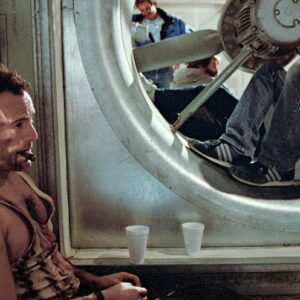Released in 1999, Fight Club directed by David Fincher and adapted from Chuck Palahniuk’s novel, was a film that immediately polarized audiences and critics alike. On the surface, it seemed like a violent, anarchic exploration of masculinity and consumerism. However, beneath its gritty exterior, the film was a complex meditation on identity, mental illness, and the crisis of modern life. Its provocative imagery, sharp dialogue, and unapologetically subversive narrative caught the attention of a generation disillusioned by the trappings of late capitalism. Despite its initial mixed reception, Fight Club has since solidified itself as a cult classic, revered for its intellectual depth and often misunderstood themes. This essay will delve into the film’s characters, particularly Brad Pitt’s role as Tyler Durden, and explore the film’s impact on popular culture and Brad Pitt’s career trajectory.
Brad Pitt’s Role as Tyler Durden
In Fight Club, Brad Pitt delivers one of his most memorable performances as Tyler Durden, a charismatic and anarchistic figure who serves as the alter ego of the film’s unnamed protagonist (played by Edward Norton). Tyler embodies everything the protagonist wishes he could be: confident, rebellious, and liberated from the constraints of modern society. He is the embodiment of anti-consumerism, rejecting the comforts of wealth, status, and materialism in favor of a life of chaos and rebellion. Pitt’s portrayal of Tyler Durden was a departure from his previous roles as a heartthrob, showcasing a raw intensity and a darker, more complex side of his acting range.
Tyler is not just a physical figure but also a symbolic one, representing the protagonist’s deepest desires and frustrations. His charismatic leadership and radical ideas lure the protagonist (and the audience) into a world of rebellion, violence, and self-destruction. At the heart of Tyler’s character is the desire to escape the monotony of modern life, where consumerism and corporate culture have stripped individuals of their authenticity. The film critiques the emasculation of men in contemporary society, where traditional notions of masculinity are replaced by consumerist ideals and a sense of powerlessness. Tyler’s message to the protagonist—and to the audience—is a call to reclaim agency, break free from societal constraints, and embrace a more primal form of existence.
However, Tyler’s philosophy of destruction and chaos comes at a cost. As the film progresses, it becomes clear that his radical ideas lead to violent, self-destructive behavior that spirals out of control. His allure and his dangerous charisma are ultimately revealed to be toxic, as his influence over the protagonist grows and the boundaries between reality and delusion blur. Pitt’s performance captures this duality perfectly—Tyler is both an enigmatic figure that offers a sense of freedom, and a dangerous force that drives the protagonist to the brink of madness.
Impact on Brad Pitt’s Career
At the time of Fight Club’s release, Brad Pitt was primarily known for his roles in films like Legends of the Fall (1994) and Se7en (1995), where he was often cast as the charming, good-looking protagonist. However, Fight Club marked a pivotal turning point in his career. By taking on the role of Tyler Durden, Pitt demonstrated a willingness to subvert his own image and challenge the expectations placed on him as a Hollywood heartthrob. The film’s violent and provocative content, coupled with his portrayal of a deeply complex and morally ambiguous character, cemented his status as an actor capable of handling more challenging, unconventional roles.
While Pitt’s fame as a leading man had earned him a substantial following, Fight Club allowed him to transition into more diverse and nuanced performances. Following the success of the film, Pitt went on to tackle an array of complex characters in films such as 12 Monkeys (1995), The Assassination of Jesse James by the Coward Robert Ford (2007), and Inglourious Basterds (2009). These roles showcased his range and ability to move beyond the superficial allure that initially made him famous. In many ways, Fight Club was the catalyst for Pitt’s evolution as an actor and helped him gain the respect of critics who had previously viewed him as little more than a pretty face.
Pitt’s transformation in Fight Club also solidified his place in the annals of Hollywood history as a versatile and daring actor. As Tyler Durden, he was not just a symbol of masculinity but also a reflection of the film’s exploration of identity and personal crisis. This complexity in his performance contributed to the lasting impact of the character and the film itself.
Cultural and Psychological Influence
Fight Club became a cultural touchstone for many, particularly Generation X, who saw in the film a sharp critique of the world they inherited. In the late 1990s, America was in the midst of a consumerist boom, and the film’s bleak portrayal of society’s obsession with materialism resonated with those who felt disconnected from traditional forms of success. The film’s themes of alienation, identity crisis, and disillusionment with the “American Dream” tapped into a sense of generational frustration, making it especially relevant to young viewers at the time.
On a psychological level, Fight Club delves deep into the complexities of the human psyche. The film’s exploration of dissociative identity disorder, where the protagonist’s alter ego (Tyler Durden) represents his inner rebellion, provides a powerful metaphor for the struggle between the self and societal expectations. As the protagonist grapples with his inner demons, the audience is invited to examine their own relationship to consumerism, self-worth, and identity. The film’s chaotic imagery and surreal narrative force viewers to question their understanding of reality and the nature of personal transformation. In this sense, Fight Club is as much a psychological thriller as it is a social critique.
However, the film’s controversial themes have often been misinterpreted. While Fight Club critiques toxic masculinity and the dangers of unchecked violence, many have mistakenly embraced its anarchistic message without fully understanding its darker implications. The film’s critique of consumer culture and its portrayal of violence as a form of liberation can easily be misread as a glorification of these ideas. In reality, Fincher and Palahniuk are presenting a cautionary tale about the dangers of embracing such extreme ideologies, as the protagonist ultimately realizes that Tyler’s vision is ultimately destructive and self-destructive.
Legacy of Tyler Durden
The character of Tyler Durden has become an enduring figure in popular culture. His iconic red leather jacket, spiked hair, and sharp one-liners have made him a symbol of rebellion and freedom from societal constraints. In the years following Fight Club’s release, Tyler Durden became a touchstone for discussions around masculinity, mental health, and the breakdown of traditional gender roles. His radical rejection of conventional life has resonated with those seeking an escape from the pressures of modern society, even as his more dangerous traits serve as a warning against embracing his philosophy uncritically.
Tyler’s influence can also be seen in fashion, as his distinct style—emphasizing casual yet rebellious clothing—has inspired trends and became synonymous with a certain kind of anti-establishment attitude. The film’s bold visual aesthetic, combined with Tyler’s memorable appearance, contributed to the lasting impact of his character on pop culture. His persona also sparked broader conversations about the emotional and psychological toll of modern life, especially the pressure to conform to societal expectations of success and identity.
The legacy of Tyler Durden extends beyond fashion and pop culture. His character has become a symbol of self-destruction, a representation of the toxic aspects of masculinity, and a cautionary tale about the dangers of idolizing unchecked freedom and rebellion. Fight Club’s legacy is not just one of nihilism and chaos, but also of introspection and self-awareness, forcing audiences to confront their own ideas of masculinity, identity, and the meaning of freedom in a consumer-driven world.
Conclusion
Fight Club remains one of the most iconic and polarizing films of the late 20th century. Through Brad Pitt’s unforgettable portrayal of Tyler Durden, the film explores complex themes of masculinity, identity, consumerism, and psychological transformation. While its controversial nature and violent content initially caused it to be misunderstood, Fight Club has since earned its place as a cult classic, influencing a generation of viewers and sparking debates about the meaning of personal freedom and the dangers of radical ideologies. Tyler Durden’s legacy endures as a symbol of both liberation and destruction, reminding us of the fine line between self-empowerment and self-destruction in a world driven by consumerism and societal pressures.





